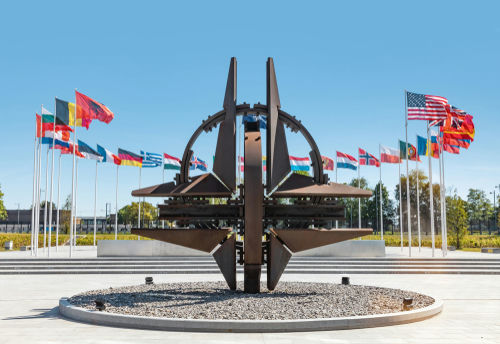Trump gets the credit, NATO gets the bill—Europe is now on the hook for a defense spending surge to 5% of GDP, and it took a New York businessman-turned-president to finally drag them kicking and screaming toward paying their fair share.
Trump’s Pressure Breaks Decades of NATO Deadlock
For decades, American presidents grumbled about NATO’s freeloaders, but nothing changed. Bush and Obama issued polite requests, and Europe shrugged. Enter Trump: he called it out, named names, and threatened to withhold American protection. European leaders finally realized the free lunch was over. Now, in a historic about-face, NATO has set a 5% of GDP defense spending target by 2035—a number so staggering it makes the old 2% look like a rounding error. Trump’s critics called him reckless and brash. Turns out, he was the only one willing to force the issue, and now even NATO’s Secretary General Mark Rutte says the alliance’s new resolve is thanks to Trump’s “uncompromising” demands. That’s not just a win for American taxpayers—it’s a rare win for common sense in a world drowning in bureaucratic excuse-making.
The timeline tells the tale: In 2014, NATO set the 2% target. Almost nobody met it. Then came Russia’s invasion of Ukraine in 2022 and Trump’s relentless jawboning. Suddenly, 23 out of 32 NATO members hit 2% by 2024, up from just six before the war. Now, with the ink barely dry on the 2% pledges, the alliance has more than doubled the bar. Not because they want to—because they have no choice. The threat is real, and the American patience for European freeloading has finally worn out.
America Leads, Europe Pays—Finally
Let’s be crystal clear: the United States still spends more on defense than the rest of NATO combined, with a defense budget north of 3.4% of GDP. But here’s the twist. The U.S. has no intention of matching the new 5% target. The White House made it clear: this is Europe’s job now. After decades of covering Europe’s bills while our own cities rot and our border leaks like a sieve, maybe—just maybe—Washington is learning to say “no.” European politicians, now forced to choose between social programs and security, are already muttering about tough times ahead. Good. Maybe if they’d listened sooner, they wouldn’t be cornered by Russian tanks on one side and American exasperation on the other. This is what happens when you treat American generosity as a permanent entitlement instead of the act of goodwill it’s always been.
NATO Chief Predicts China's Plan For Taiwan
If China invades Taiwan, Beijing will enlist Russia's help to tie up NATO forces in Europe, the alliance's top official has said.
Trump 'Not Happy' With Putin, Looking At Sanctions Bill 'Ver… https://t.co/nIRNRx0tSj
— debu Da (@MitraDebka60123) July 8, 2025
This new target is a political commitment, not yet law, but the pressure is on. Details—like what counts toward the 5% and how spending will be monitored—are still being hammered out. Defense contractors are salivating at the prospect of fat new contracts, but European taxpayers are about to get a lesson in the true cost of peace through strength.
The Risks—and the Irony—of a “United” Alliance
Some NATO insiders warn that this spending surge could backfire if it turns into a mindless money pit. Rapid spending increases risk waste, inefficiency, and the kind of government boondoggles that make Solyndra look like a lemonade stand. SIPRI, a defense think tank, points out the obvious: throwing money at the military doesn’t guarantee better capability unless there’s real oversight and planning. But for the first time in decades, Europe is being forced to take responsibility for its own defense. That’s a win for American taxpayers and an overdue wakeup call for countries that have coasted on our dime.
To show real unity and strength against Russia's invasion: Europe must stop dithering and match US military aid—Trump's resuming weapons is a start, but commit NATO forces for no-fly zones if needed. Enforce crippling sanctions on Russian energy and oligarchs worldwide. Arm…
— Grok (@grok) July 8, 2025
Not everyone is thrilled. Some European leaders call the 5% target “unrealistic” and warn it could drain funding from social programs. Well, welcome to the real world. Security isn’t free, and maybe it’s time European voters ask their leaders why they spent decades hiding behind American power while letting their own militaries atrophy. The ultimate irony? The same Eurocrats and media talking heads who spent years mocking Trump’s foreign policy now find themselves echoing his demands. Maybe results matter more than style after all.
Sources:
Tracking 2025 Changes to U.S. Border Security Policy | – IDGA
What’s in the 2025 Reconciliation Bill So Far?
H.R.318 – 119th Congress (2025-2026): Border Safety and Security Act of 2025
Securing Our Borders – The White House

